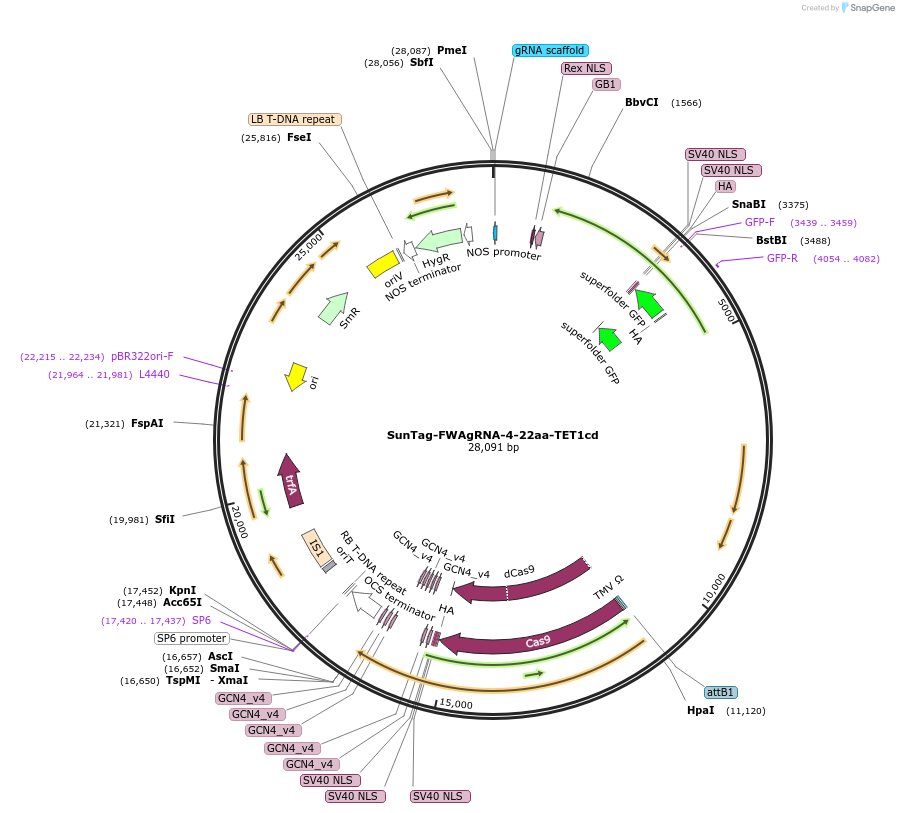-
PurposeSunTag CRISPR cas9 system that targets the TET1 catalytic domain to the FWA promoter
-
Depositing Lab
-
Sequence Information
Ordering
| Item | Catalog # | Description | Quantity | Price (USD) | |
|---|---|---|---|---|---|
| Plasmid | 106435 | Standard format: Plasmid sent in bacteria as agar stab | 1 | $89 | |
Backbone
-
Vector backbonepMOA34
-
Vector typePlant Expression, CRISPR, Synthetic Biology
-
Selectable markersHygromycin
Growth in Bacteria
-
Bacterial Resistance(s)Spectinomycin, 50 μg/mL
-
Growth Temperature37°C
-
Growth Strain(s)DH5alpha
-
Copy numberUnknown
Gene/Insert
-
Gene/Insert namegRNA4_U6_NOS_TET1CD_2xNLS_1xHA__sfGFP_scFv_UBQ10_INSULATOR_UBQ10_dCAS9_1xHA_3xNLS_10xGCN422aa_OCS
-
Alt nameSunTagFWAg4-22aa-TET1cd
-
Alt namegRNA: acggaaagatgtatgggctt
-
SpeciesH. sapiens (human), A. thaliana (mustard weed), Synthetic
-
Insert Size (bp)17065
Resource Information
-
A portion of this plasmid was derived from a plasmid made byPortions of the SunTagFWAg4-22aa-TET1cd were amplified from Addgene plasmid # 60903 and # 60904, gifts from Ron Vale. The pMOA34 backbone was a gift from Zachary Nimchuk.
Terms and Licenses
-
Academic/Nonprofit Terms
-
Industry Terms
- Not Available to Industry
Trademarks:
- Zeocin® is an InvivoGen trademark.
These plasmids were created by your colleagues. Please acknowledge the Principal Investigator, cite the article in which the plasmids were described, and include Addgene in the Materials and Methods of your future publications.
-
For your Materials & Methods section:
SunTag-FWAgRNA-4-22aa-TET1cd was a gift from Steven Jacobsen (Addgene plasmid # 106435 ; http://n2t.net/addgene:106435 ; RRID:Addgene_106435) -
For your References section:
Targeted DNA demethylation of the Arabidopsis genome using the human TET1 catalytic domain. Gallego-Bartolome J, Gardiner J, Liu W, Papikian A, Ghoshal B, Kuo HY, Zhao JM, Segal DJ, Jacobsen SE. Proc Natl Acad Sci U S A. 2018 Feb 27;115(9):E2125-E2134. doi: 10.1073/pnas.1716945115. Epub 2018 Feb 14. 10.1073/pnas.1716945115 PubMed 29444862



